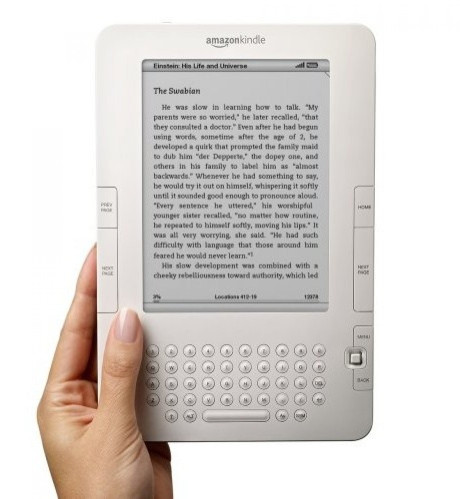How Much Does An E-Book Weigh?
ANALYSIS

People love e-readers because they can store a veritable library of books on a relatively lightweight device, which is much better than having to lug around pounds of paper. The Barnes & Noble Nook weighs 7.48 ounces, and Amazon's Kindle e-reader weighs less than 6 ounces.
One would think that an e-reader's weight remains constant, but one professor has proven otherwise. John Kubiatowicz, a computer scientist at UC Berkeley, says that the mass of the e-reader actually increases each time a book is downloaded to the device.
Kubiatowicz explained that storing new data involves holding electrons in a fixed place within the e-reader's memory. The electrons are already present in the device, but when they're allowed to float around freely, they consume about an extra billionth of a microjoule per bit of data.
Although the total number of electrons in the memory does not change as the stored data changes, Kubiatowicz said, the trapped electrons have a higher energy than the untrapped electrons.
Amazon's Kindle uses flash memory made of a set of special transistors that use trapped electrons to distinguish between a 1 and a 0.
Since energy and mass are directly related, as evidenced by Einstein's famous E=mc² formula, Kubiatowicz calculated that filling a 4GB Kindle to its storage limit would increase its weight by a billionth of a billionth of a gram, or 0.000000000000000001. The weight is roughly equivalent to that of a single virus or a DNA molecule.
The same number of books in their physical form, about 3,500, would weigh roughly two tons.
Graeme Ackland, a computer science professor at the University of Edinburgh, said, If Professor Kubiatowicz is really struggling with the extra weight, he is welcome to come to Edinburgh where it's cooler, and the lack of thermal energy in his Kindle will more than compensate.
Ackland is poking fun at Kubiatowicz, but it's true that electrons are less active in cooler temperatures and more likely to stay in place, so the Kindle would not need to exert as much power to hold onto the newly-downloaded e-book.
Consumers bought an estimated 10.3 million tablets and 6.7 million e-readers in 2010. Amazon's Kindle is the most popular e-reader, followed by Barnes & Noble's Nook.
© Copyright IBTimes 2025. All rights reserved.





















